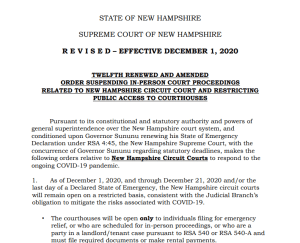Its late 2020, and courts remain partially or fully closed around the State of New Hampshire as a result of the COVID pandemic. Divorce in the time of COVID presents unique challenges.
Clerks’ offices remain closed for most courts with the exception of emergency relief filings, and in-person hearings. Those in-person hearings are themselves limited by order of the New Hampshire Supreme Court. In fact, as recently as November 24, 2020, the New Hampshire Supreme Court issued its Twelfth Renewed and Amended Emergency Orders since the COVID pandemic took hold.
Those orders run through December 21, 2020, and/or the last date of the declared State of Emergency in New Hampshire (which will likely run at least through the Spring of 2021). Courts remain open on a very restricted basis during this time. The Superior and Circuit Courts are operating under similar orders for the foreseeable future.

What does this mean for your divorce in the time
of COVID, particularly when divorce filings appear to be on the rise, due in part to couples being confined together without reprieve? Will your case ever be heard in a timely manner?
Those proceedings related to temporary hearings in divorce and parenting cases, requests for relief as to domestic violence, child-related emergency orders, placement of a juvenile, injunctive relief, emergency mental health orders, proceedings directly related to the COVID pandemic, or those proceedings deemed to be in-person by the presiding judge may be held in person. Otherwise, hearings, status conferences and even trials are being conducted by way of telephonic and video platform hearings (the courts are currently using WebEx as a platform for video conferencing).
Though some courts have experienced significant delays in scheduling due to the COVID-19 pandemic, others have not. In many cases, access to the judiciary by way of telephonic and video platforms have enabled swifter and more economical access to justice. Prior to COVID, travel to and from a Court for a simple 30-minute scheduling conference could have meant hours of time amongst travel. Those significant wait times as other cases ran over, and other unanticipated delays, created numerous problems for litigants. With the onset of video conferencing and telephonic hearings, many of those previously extended court appearances have been significantly streamlined.
In the event of substantial delays on the part of the court, both private and court-appointed mediators have made themselves available to conduct mediations over ZOOM, telephone and via other video conferencing platforms. Access to justice, in large part, has not been negatively impacted in the realm of family law. No one knows what the future holds, but the ability of the judicial system to adapt to a pandemic and to embrace, in some instances, never before seen technology, has enabled most to continue to gain timely relief and access to justice.
Want to learn more? Contact us.

